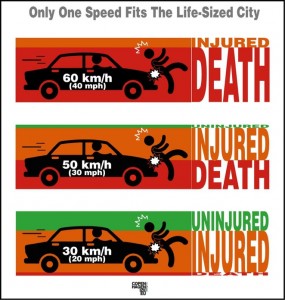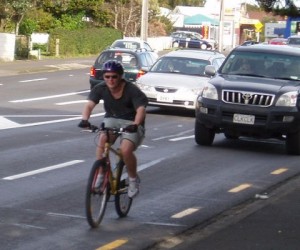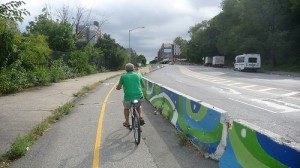 There has been some great discussion lately on this blog about lowering speed limits. An example was given of the Albert Road/Victoria Road (Devonport) corridor after the roundabout with Lake Road. Apparently, there was a proposal to reduce the speed limit to 30km/h and this was opposed by the Police. I am not sure what NZTA/AT had to say.
There has been some great discussion lately on this blog about lowering speed limits. An example was given of the Albert Road/Victoria Road (Devonport) corridor after the roundabout with Lake Road. Apparently, there was a proposal to reduce the speed limit to 30km/h and this was opposed by the Police. I am not sure what NZTA/AT had to say.
It seems like such a no brainer as that route is a dead end and lowering the speed limit would help increase visitors by making it more pedestrian and cyclist friendly. Really what is needed is a shared space like in Fort Street. As with Fort Street, this would be a boon to the struggling local businesses and would fit in with the current remodelling of the area in front of the Devonport ferry building. In addition, the difference between driving that 1km distance at 50km/h and 30km/h is around 10 seconds.

This article debates what the speed limit should be within cities and points out the exponential risk to all road users, but especially pedestrians and cyclists, from higher speed limits. Speed limits are normally set by using the 85th percentile rule (a rule based on cutting edge research – from 1964), which means that the speed limit should reflect the speed that 85% of motorists drive under. No account is taken of whether that speed is appropriate for the area or if it creates a safe atmosphere for the child wanting to cycle to school or the elderly lady cycling down to get a loaf of bread.
There doesn’t just need to be some tinkering around the edges on the design of our streets. There needs to be a paradigm shift on how we think about streets and who they are used by. We must remove cars from the top of our transport hierarchy and put people back.

We should start by assuming that the speed limit on all streets within the city should be 30km/h. A case must then be made for the speed limit being higher. That higher limit can only be instigated once pedestrians and cyclists are safely separated from the motor traffic. Simple and yet so difficult.
Aren’t cities about people?



